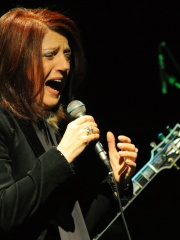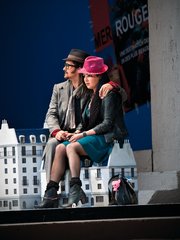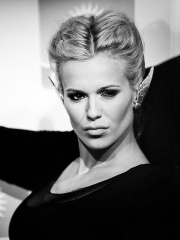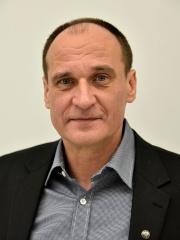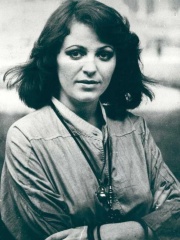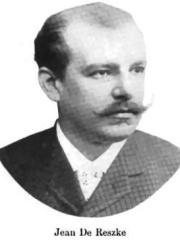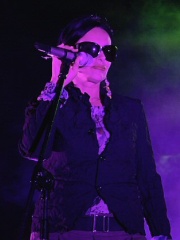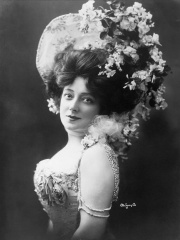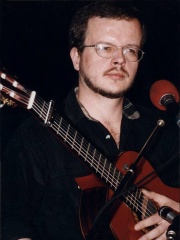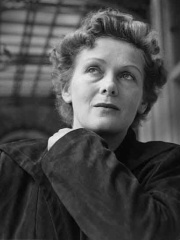
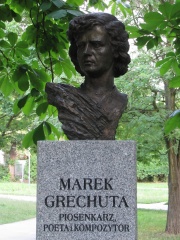



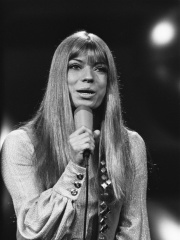
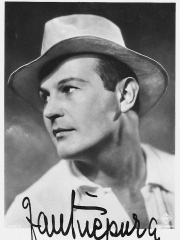

The Most Famous
SINGERS from Poland
Top 10
The following people are considered by Pantheon to be the top 10 most legendary Polish Singers of all time. This list of famous Polish Singers is sorted by HPI (Historical Popularity Index), a metric that aggregates information on a biography's online popularity. Visit the rankings page to view the entire list of Polish Singers.

1. Elisabeth Schwarzkopf (1915 - 2006)
With an HPI of 68.73, Elisabeth Schwarzkopf is the most famous Polish Singer. Her biography has been translated into 40 different languages on wikipedia.
Dame Olga Maria Elisabeth Friederike Schwarzkopf, (German: [eˌliːzabɛt ˈʃvaʁt͡skɔp͡f] ; 9 December 1915 – 3 August 2006) was a German-born Austro-British lyric soprano. She was among the foremost singers of lieder, and is renowned for her performances of Viennese operetta, as well as the operas of Mozart, Wagner and Richard Strauss. After retiring from the stage, she was a voice teacher internationally. She is considered one of the greatest sopranos of the 20th century.

2. Marek Grechuta (1945 - 2006)
With an HPI of 62.39, Marek Grechuta is the 2nd most famous Polish Singer. His biography has been translated into 63 different languages.
Marek Michał Grechuta (10 December 1945 – 9 October 2006) was a Polish singer, songwriter, composer, and lyricist.

3. Justyna Steczkowska (b. 1972)
With an HPI of 61.60, Justyna Steczkowska is the 3rd most famous Polish Singer. Her biography has been translated into 36 different languages.
Justyna Maria Steczkowska (Polish pronunciation: [juˈstɨna stɛt͡ʂˈkɔfska]; born 2 August 1972) is a Polish singer and songwriter. She represented Poland in the Eurovision Song Contest 1995 with the song "Sama", finishing in 18th place overall with 15 points, representing the country again in the Eurovision Song Contest 2025 with the song "Gaja", finishing in 14th place overall with 156 points.

4. Maryla Rodowicz (b. 1945)
With an HPI of 60.95, Maryla Rodowicz is the 4th most famous Polish Singer. Her biography has been translated into 22 different languages.
Maria Antonina Rodowicz, known professionally as Maryla Rodowicz, (Polish pronunciation: [maˈrɨla rɔˈdɔvit͡ʂ] born 8 December 1945 in Zielona Góra), is a Polish singer, guitarist and actress. Throughout over 60 years of her career, she released twenty Polish and four foreign-language studio albums including five with platinum and three with gold certifications and selling over 15 million records. Known for her close collaboration with Agnieszka Osiecka and Seweryn Krajewski, her most popular songs include "Małgośka" (1974), "Futbol" (1974), "Remedium" (1978), "Niech żyje bal" (1984), "Łatwopalni" (1997) and "Wszyscy chcą kochać" (2005). She remains one of the most prominent and successful artists in the history of popular music in Poland. Among the numerous awards and decorations she received are Gold Cross of Merit, Commander's Cross of the Order of Polonia Restituta and Gold Medal for Merit to Culture – Gloria Artis.
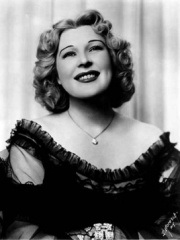
5. Miliza Korjus (1905 - 1980)
With an HPI of 59.69, Miliza Korjus is the 5th most famous Polish Singer. Her biography has been translated into 22 different languages.
Miliza Elizabeth Korjus (August 18, 1909 – August 26, 1980) was a Polish-Estonian lyric coloratura soprano opera singer who appeared in classical American and Mexican sound films during the Golden Age of Hollywood. Korjus became a naturalized United States citizen in her adulthood. She was nominated for the Academy Award for Best Supporting Actress in 1939 for her performance in The Great Waltz.

6. Basia (b. 1954)
With an HPI of 59.26, Basia is the 6th most famous Polish Singer. Her biography has been translated into 22 different languages.
Barbara Stanisława "Basia" Trzetrzelewska (Polish: [ˈbaɕa tʂɛtʂɛˈlɛfska] ; born 30 September 1954), better known mononymously as Basia, is a Polish singer-songwriter and recording artist noted for her Latin-inspired jazz-pop music. She began singing professionally in various Polish bands beginning in the late 1960s and during the 1970s, then moved to the UK in 1981. She rose to fame as a singer in the British trio Matt Bianco. By 1986, Basia and her bandmate Danny White had left the group to focus on her solo career. She signed with Epic Records and enjoyed a successful international career from 1987 until 1995, particularly in the U.S., where her first two albums Time and Tide and London Warsaw New York both sold more than a million copies. Her biggest hits include "Time and Tide", "New Day for You", "Promises", "Baby You're Mine", "Cruising for Bruising", and "Drunk on Love". She also developed a following in Asia. She took a lengthy hiatus due to personal tragedies. She made a comeback to regular recording and performing beginning with the release of the Matt Bianco reunion album Matt's Mood in 2004. She releases her music through independent labels.

7. Katja Ebstein (b. 1945)
With an HPI of 59.05, Katja Ebstein is the 7th most famous Polish Singer. Her biography has been translated into 23 different languages.
Katja Ebstein (born Karin Witkiewicz; 9 March 1945) is a German singer. She was born in Girlachsdorf (now Gniewków, Poland). She achieved success with songs such as "Theater" and "Es war einmal ein Jäger". She was married to Christian Bruhn, who wrote many of her songs. Ebstein represented Germany at the Eurovision Song Contest three times, in 1970, 1971 and 1980. She also took part in Ein Lied für Stockholm in 1975 with the song "Ich liebe dich", placing 5th in the selection. Her best performance was in 1980 when she gained second place with the entry "Theater", her other two songs "Wunder gibt es immer wieder" and "Diese Welt" each came to third places. As noted by John Kennedy O'Connor in his book The Eurovision Song Contest – The Official History, Ebstein is the most successful performer to have taken part in the contest without ever winning. She is the only singer to appear in the top three on three occasions, without winning.

8. Jan Kiepura (1902 - 1966)
With an HPI of 58.42, Jan Kiepura is the 8th most famous Polish Singer. His biography has been translated into 17 different languages.
Jan Wiktor Kiepura (Polish: [ˈjan ˈviktɔr kʲɛˈpura]; May 16, 1902 – August 15, 1966) was a Polish opera singer (lyric tenor / lirico spinto, Heldentenor) and actor. He enjoyed a successful international career and performed at leading opera houses around the world including La Scala, Metropolitan Opera, Royal Opera House, Opéra-Comique, La Fenice and Teatro Colón. He was the recipient of numerous national and international distinctions and honours including Poland's Order of Polonia Restituta, France's Legion of Honour and Sweden's Order of the Polar Star.

9. Anna Maria Jopek (b. 1970)
With an HPI of 58.37, Anna Maria Jopek is the 9th most famous Polish Singer. Her biography has been translated into 78 different languages.
Anna Maria Jopek (born 14 December 1970) is a Polish vocalist, songwriter, and improviser. She represented Poland in the 1997 Eurovision Song Contest, with the song "Ale jestem" and finished 11th out of 25 participating acts; and in 2002, she collaborated on an album with jazz guitarist Pat Metheny. She has received numerous awards for her music, including Michel Legrand's Personal Award in Vitebsk in 1994, as well as all of the awards for music in Poland, together with gold and platinum records.
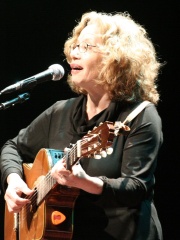
10. Chava Alberstein (b. 1946)
With an HPI of 57.51, Chava Alberstein is the 10th most famous Polish Singer. Her biography has been translated into 22 different languages.
Chava Alberstein (Hebrew: חוה אלברשטיין [ˈχava ˈʔalbeʁʃtejn], born 8 December 1946 in Poland) is an Israeli musician, lyricist, composer, and musical arranger. She moved to Israel in 1950 and started her music career in 1964. Alberstein has released over sixty albums in Hebrew, English, and Yiddish. She is known for her liberal activism and advocacy for human rights and Arab-Israeli unity, which has sometimes stirred controversy, such as the ban of her song "Had Gadya" by Israel State Radio in 1989. Alberstein has received numerous accolades, including the Kinor David Prize, the Itzik Manger Prize, and honorary doctorates from several universities.
People
Pantheon has 42 people classified as Polish singers born between 1850 and 2005. Of these 42, 33 (78.57%) of them are still alive today. The most famous living Polish singers include Justyna Steczkowska, Maryla Rodowicz, and Basia. The most famous deceased Polish singers include Elisabeth Schwarzkopf, Marek Grechuta, and Miliza Korjus. As of April 2024, 3 new Polish singers have been added to Pantheon including Piotr Beczała, Luna, and Dawid Podsiadło.
Living Polish Singers
Go to all RankingsJustyna Steczkowska
1972 - Present
HPI: 61.60
Maryla Rodowicz
1945 - Present
HPI: 60.95
Basia
1954 - Present
HPI: 59.26
Katja Ebstein
1945 - Present
HPI: 59.05
Anna Maria Jopek
1970 - Present
HPI: 58.37
Chava Alberstein
1946 - Present
HPI: 57.51
Urszula Dudziak
1943 - Present
HPI: 55.13
Edyta Górniak
1972 - Present
HPI: 52.93
Piotr Beczała
1966 - Present
HPI: 52.53
Doda
1984 - Present
HPI: 50.69
Paweł Kukiz
1963 - Present
HPI: 50.11
Kayah
1967 - Present
HPI: 48.85
Deceased Polish Singers
Go to all RankingsElisabeth Schwarzkopf
1915 - 2006
HPI: 68.73
Marek Grechuta
1945 - 2006
HPI: 62.39
Miliza Korjus
1905 - 1980
HPI: 59.69
Jan Kiepura
1902 - 1966
HPI: 58.42
Anna Jantar
1950 - 1980
HPI: 55.69
Jean de Reszke
1850 - 1925
HPI: 54.63
Olga Jackowska
1951 - 2018
HPI: 54.12
Anna Held
1872 - 1918
HPI: 51.96
Jacek Kaczmarski
1957 - 2004
HPI: 51.79
Newly Added Polish Singers (2025)
Go to all RankingsPiotr Beczała
1966 - Present
HPI: 52.53
Luna
1999 - Present
HPI: 40.74
Dawid Podsiadło
1993 - Present
HPI: 37.33
Overlapping Lives
Which Singers were alive at the same time? This visualization shows the lifespans of the 9 most globally memorable Singers since 1700.

